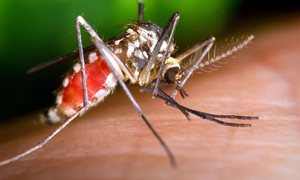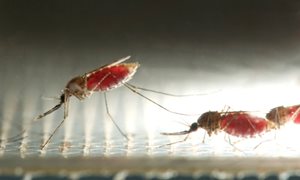 Richard Bartfai, theme Infectious diseases and global health, and Clemens Kocken (BPRC) received 675,000 euros from ZonMw to uncover the molecular mechanisms underlying dormancy of malaria parasites, a major obstacle to efficient treatment of Plasmodium vivax malaria.
Richard Bartfai, theme Infectious diseases and global health, and Clemens Kocken (BPRC) received 675,000 euros from ZonMw to uncover the molecular mechanisms underlying dormancy of malaria parasites, a major obstacle to efficient treatment of Plasmodium vivax malaria.
Plasmodium vivax causes severe morbidity in Asia and South-America and is regarded as a major challenge to malaria elimination. The biggest obstacle in fighting P. vivax is the presence of dormant parasites. These, so called, hypnozoites can stay dormant in the liver without any symptoms for weeks to years, survive treatment of blood stage infection and reactivate causing malaria without renewed exposure to infected mosquitos. In order to better target hypnozoites, it is important to unravel the mechanisms behind their dormancy and reactivation. Hypnozoites, however, have long been inaccessible for experimental investigations and hence represent a major knowledge gap in our understanding of the parasite’s life cycle, which in turn hinders drug development.
Therefore, in this project, Clemens Kocken and Richard Bartfai will form a powerful partnership to combine state-of-the-art genomic technologies and a unique transgenic model system to understand mechanisms that drive liver stage parasites into dormancy or dictate their reactivation. These insights may prove essential to further vivax malaria control and elimination by paving the way for new and innovative approaches to target this critical human pathogen.
Related news items

Grants for research on magnesium deficiency and malaria Vidis for Felix Hol and Jeroen de Baaij
1 July 2022 Radboudumc researchers Jeroen de Baaij and Felix Hol both receive an NWO Vidi grant for their research, respectively on magnesium deficiency in type 2 diabetes and on malaria. go to page
Field research on malaria vaccine offers unexpected surprise
23 May 2022Field research on the effectiveness of a malaria vaccine, came up with unexpected results for an international group of researchers including Benjamin Mordmüller of Radboudumc. The vaccine evokes a broader response against malaria proteins than there are in the vaccine.
go to page
Rubicon grants awarded to three RIMLS researchers
19 April 2022Three researchers have received Rubicon funding from NWO/ZonMw. This will enable Elke Muntjewerff, Laura de Vries and Laurens van de Wiel to do research at a foreign research institute for the next two years.
go to page


